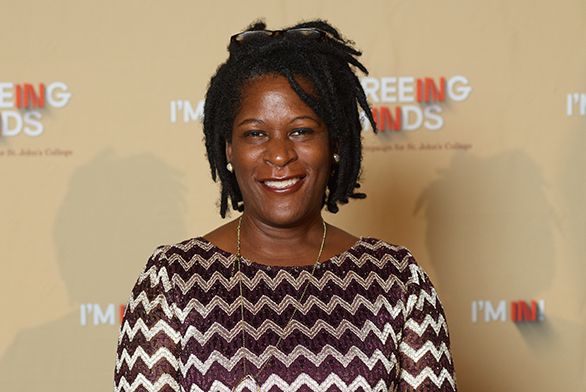Alumna Speaks on Great Books as “A Polaris for the African-American People”
October 15, 2019 | By Tessa Wild (A23)

A few weeks ago, I attended the faculty’s annual Liberal Education Seminar featuring Graduate Institute alumna Anika Prather (AGI09). Her talk, titled “The Great Books, A Polaris for the African American People: Exploring the Role the Great Books Have Played in the Educational History of the African American People,” explored how the classics affect people of various races, genders, and economic backgrounds. As we sat around a Johnnie table, Dr. Prather spoke about how many African American authors, including W. E. B Du Bois and James Baldwin, had shown her that the classics are meant for everyone—that no matter who you are, the classics have something to offer.
Great Books, Prather said, “tell the human story.” She spoke with passion about how many famous people of color throughout history used the Great Books to further their goals and ideas. Activist Huey P. Newton, she pointed out, taught himself to read using Plato’s Republic—a text paid special attention to during freshman year at St. John’s—and as a result, Newton’s way of thinking was highly influenced by the thoughts and ideas of Plato. Studying the Great Books, Prather says, shouldn’t—and can’t—be only for a select few.
One author who particularly inspires Prather is Frederick Douglass. Douglass taught himself to read while still a slave, an action expressly forbidden. Once he learned to read, however, literacy became his “polaris.” His first book was The Columbian Orator, an anthology of excerpts from many of the Great Books.
“By using the literature of the master,” said Prather, “he allowed these books to somehow unchain his mind well before he unchained his body from the bonds of slavery.”
Another author cited by Prather was Dr. Martin Luther King Jr. She was particularly interested, she said, in the fact that his “Letter From a Birmingham Jail” was inspired by the works of St. Thomas Aquinas.
“Many of his speeches, essays and other writings cite the authors from the Great Books list,” she said.
Discovering connections like this gave Prather the idea to look up the bonds between great African-American authors and the Great Books while working with her students. Students would then read “both the African American texts and then the Great Books texts that were referenced in [them],” she explained. “Our discussions would include comparing and contrasting both texts.”
“When we don’t expose our young people to this literature,” she added, “they miss out on so much.”
During her talk, Prather explained her perspective that keeping the classics away from young people, especially the disenfranchised, has only served to push people down. If W.E.B. Du Bois, Martin Luther King Jr., Frederick Douglass, and so many others were “able to take hold of the hands of the Great Books, [and allow] these texts to pull them from the black hole of slavery and anonymity,” she said, “then surely it can do something as significant for my students.”
St. John’s, said Prather, helped her discover and explore her beliefs about the universal importance of the Great Books.
“I was in a fog before I came,” she said. “St. John’s is an oasis, because you meet so many people who think like you ... through that dialogue, we became family. We became one.”
“St. John’s ... wasn’t about the color of your skin—we all sat around a table and explored,” she added, explaining that we should not only embrace our differences but allow our unique experiences to inform our discussion and understanding of the Great Books.
“A student may be on one path, but these texts can change their way of thinking, their way of being, their way of seeing the world,” said Prather. “But we have to bring it to the table. And these books? They allow us to bring it to the table.”

